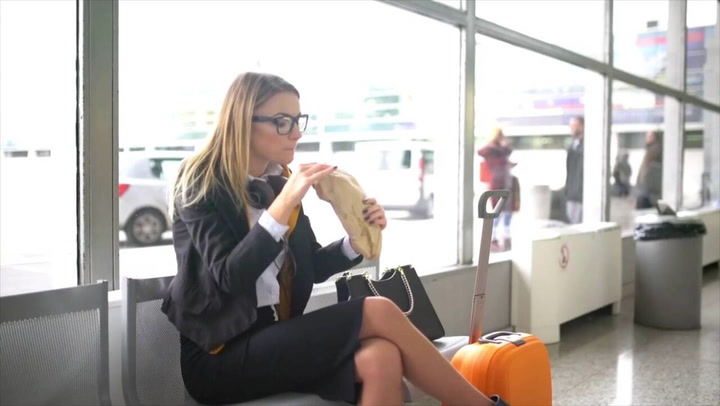1. Introduction
Maybe just pack a snack for your next flight instead.
If you’re heading out on a vacation, odds are, whipping up a snack for the airport is the last thing on your mind. Ensuring you’ve packed the right clothes, completed the proper travel forms, and checked into your flight are usually the top priorities. And that’s OK because airport dining has actually gotten pretty sophisticated, with some even boasting Michelin-starred establishments.
2. Foods to Avoid at the Airport
However, there are still a few foods you should avoid both purchasing and eating at an airport, due to everything from their poor nutritional value to their potential to make you ill during your flight. Here are seven foods you should never buy at the airport.
2.1 Salad Bar
:max_bytes(150000):strip_icc():format(webp)/salad-bar-salads-DONTEAT0422-3417cf740e324753ba33241d3b695a3a.jpg)
A nice, leafy green salad may sound like the ideal healthy choice while traveling through the airport. However, the salad bar may also be a hotbed of germs, including those that can lead to food poisoning.
As the Centers for Disease Control and Prevention (CDC) shared, while vegetables are essential for a healthy diet, leafy greens are sometimes contaminated with harmful germs. Washing them does not remove all germs, as they can stick to the leaves and even get inside them. If you eat contaminated leafy greens without cooking them first, you might get sick. Germs on produce eaten raw cause a large percentage of U.S. foodborne illnesses and are a major source of E. coli O157 infections.
2.2 A Massive Coffee
:max_bytes(150000):strip_icc():format(webp)/giant-coffee-DONTEAT0422-b0fba4a864f04f7684568f94d0480189.jpg)
A warm, soothing coffee may be exactly what you’re craving before an early morning flight; however, we suggest holding off if you can. That’s because coffee can lead to jitters and frequent bathroom visits, which can be uncomfortable at 30,000 feet.
Mayo Clinic reports that drinking caffeine-containing beverages as part of a normal lifestyle doesn’t cause fluid loss in excess of the volume ingested. While caffeinated drinks may have a mild diuretic effect, they don’t appear to increase the risk of dehydration. Furthermore, it notes that caffeinated drinks can cause headaches and insomnia in some individuals, which isn’t ideal if you’re trying to rest during your flight.
2.3 Salty French Fries and Pretzels
:max_bytes(150000):strip_icc():format(webp)/pretzels-salty-fries-DONTEAT0422-b2956e95373f40419f4e83448351a41f.jpg)
Salty foods like French fries and pretzels may sound delicious, but even on the ground, they can lead to bloating. When combined with a flight at 35,000 feet, the discomfort can multiply.
As U.S. News explains, air pressure decreases at higher altitudes, which means gas, including what’s in your stomach, will expand. Consequently, whatever gas is present can create more pressure against the bowel walls as you ascend. Therefore, it’s advisable to avoid these salty snacks if possible.
2.4 High-sugar Yogurts
:max_bytes(150000):strip_icc():format(webp)/sugary-yogurts-DONTEAT0422-148d821ce601451a9628c1ad7cd459ba.jpg)
If you’re rushed and need a quick snack, those tiny yogurts might appear to be the perfect choice. However, beware because they could contain a significant amount of sugar, which isn’t ideal before a flight.
Kara Landau, a dietitian, recommends avoiding yogurt parfaits and fruit smoothies due to their added sugar and hidden additives, as they may aggravate the gut. Instead, look for options that provide more protein, dietary fiber, and healthy fats, such as plain Greek yogurt or nuts without added oils.
2.5 Cocktails
:max_bytes(150000):strip_icc():format(webp)/cocktails-DONTEAT0422-51b7f288c5c145d69618214fa4ca97c4.jpg)
Having a drink in the airport before a flight is a common practice for many travelers looking to launch their vacation in style. However, it may be wise to limit your intake, as the effects can be magnified while airborne.
According to the KLM blog, during a flight, the cabin pressure is lower than it is at ground level. This decreases the body’s ability to absorb oxygen, which can lead to lightheadedness. If you consume alcohol before or during a flight, you may experience this feeling even more quickly. Hence, if you indulge, drink water in between to stay hydrated.
2.6 Deli Meats
:max_bytes(150000):strip_icc():format(webp)/deli-meats-sandwiches-DONTEAT0422-396639fc310d418b887a017f9c7456dc.jpg)
It’s additional bad news for deli sandwich lovers too. According to the CDC, packaged meats can harbor harmful bacteria, especially if they’ve been sitting out. The CDC warns to avoid eating deli meats unless they are heated to at least 165°F just before serving.
2.7 Sushi
:max_bytes(150000):strip_icc():format(webp)/airport-sushi-DONTEAT0422-94692526a8c34c7aaeff62e41ad37f02.jpg)
Lastly, sushi can be a risky choice at the airport. The CDC states that it is best to avoid raw or undercooked fish or shellfish. Additionally, sushi may not be the best option if you tend to favor high-sodium sauces, such as soy sauce, which can contribute significantly to your daily salt intake.




